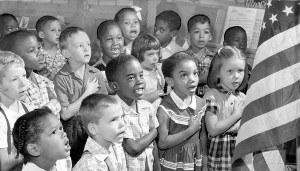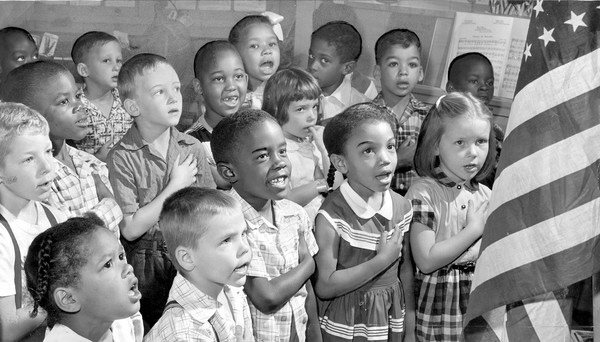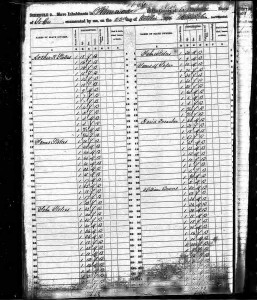Both sides of my family have been in America since the settlement of the American colonies—my mother’s side seeking religious refuge in the Massachusetts Bay Colony circa 1575, and my father’s side embarking on the journey to find economic opportunity in the Carolina Colony. Because my family has been in our country since its birth, the establishments they settled in shaped the direction both sides of my family took. Specifically for the Bowers family of the Carolina colony, America runs in our blood. Our very first ancestor, Giles Bowers, was a patriot soldier brutally murdered by Tory soldiers in his own home. Giles’ brutal death set forth a sense of loyalty to America, which continued from generation to generation.
Despite my family’s loyalties to our free country, due to our Southern based heritage, slavery and the slave trade played a large role in my family’s history. At one time owning close to fifty black slaves, depicted in the slave census quota shown in Figure 1, the Bowers family of Hampton, South Carolina endorsed slavery. We know today that slavery is an unjust practice, but during the antebellum period, slavery was the driving force of southern economy. Slavery was a justifiable practice in the eyes of my ancestors.

Figure 2: Charleston Slave Market
http://haygenealogy.com/dankenbring/patriots/civilwar/plantationbios.html
However, not all Americans felt this way. Thus, on the dawn of the Civil War, my ancestor William Ralph Bowers, born in 1839 to John and Carrie Ulmer Bowers, enlisted in Lieutenant General Wade Hampton III’s Third Regiment of the Confederate Army. He fought for the preservation of the South: he fought for slavery. Slavery was part of the culture. In fact, Charleston, South Carolina was the single largest slave trading post in the entire country—a place just up the road from Hampton. Figure 2 is a depiction of the legendary Charleston Slave Market, likely where my ancestors bought their slaves. In those times, it was a social and economical norm to endorse the slave trade, and therefore the Confederacy fought to keep this practice alive. In the end, however, the Confederacy failed and slavery was abolished. Despite the abolition of slavery, though, it wasn’t until many years later that my family shed the superiority they once felt over African Americans.

Figure 3: Integrated Classroom
US Slave Blog
http://usslave.blogspot.com/2013/07/american-apartheid-schooling-brown-vs.html
Two generations later, to be exact, James Mack Bowers, William Ralph Bowers’ grandson and my grandfather, defied the history of my family and their history with slavery. His best friend was a black man, named Mr. Willie Payne. To my grandfather, the color of one’s skin was not a factor. During integration, my father’s name was chosen at random to be bussed to an all black school in Mississippi. So, between the grades of kindergarten and fourth grade, my dad was bussed to four different schools due to desegregation protocol. He became a minority at each new school, in a similar setting to the classroom shown in Figure 3. But, being bussed allowed my father to acquire the same trait my grandfather had: the ability to go beyond skin color and look solely at the person underneath. My grandfather stood against the prejudice induced by former social constructs of the South, an attitude that was then passed down to my father, and from my father to me.
Now, I have taken this battle against injustice a step further. After hearing a speech on human trafficking, I have made it my personal goal to make war on this form of modern-day slavery. I hope to one day become a lawyer—a criminal prosecutor equipped and ready to take down the thirty-two billion dollar a year business: one that lacks exposure and is hard to combat. More specifically, I strive to get a job at International Justice Mission, and because of the traditions passed down to me from my family, I am more ready than ever to fulfill my calling and help to abolish slavery for good.

